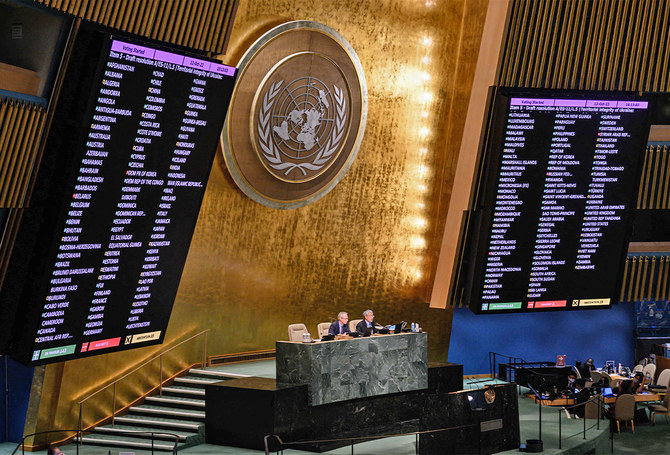ISLAMABAD: The UN General Assembly has adopted a resolution calling on countries not to recognize the four regions of Ukraine claimed by Russia, with Pakistan abstaining, state-run APP reported on Thursday.
Three-quarters of the 193-member General Assembly — 143 countries — backed on Wednesday a resolution condemning Russia’s “attempted illegal annexation” of the four partially occupied regions in Ukraine.
Only Syria, Nicaragua, North Korea and Belarus joined Russia in voting against the resolution, while 35, including Pakistan and Moscow’s strategic partner, China, abstained, and the rest did not vote.
The resolution “defending the principles” of the UN Charter said the regions of Donetsk, Kherson, Luhansk and Zaporizhzhia were temporarily occupied by Russia as a result of “aggression, violating Ukraine’s territorial integrity, sovereignty and political independence,” APP reported.
Explaining his vote, Pakistan’s Ambassador to the UN, Munir Akram, regretted that the co-sponsors of the resolution did not accept proposals for an immediate peaceful resolution of the conflict.
“Irrespective of the origin of the conflict, the highest priority, at this moment, is the immediate cessation of hostilities and the resumption of a peaceful dialogue – through direct negotiations, mediation or other peaceful means – to resolve the causes of the conflict and restore peace and security in Ukraine,” he said.
“Unless we halt the conflict, there is every likelihood that it will escalate further, with consequences that could be devastating for the entire world.”
The Pakistani envoy, while acknowledging Ukraine’s complex history, said under international law, the right of self-determination applied to people living under foreign or colonial domination, and those who had not yet exercised the right to self-determination, as in the case of Indian-administered Kashmir.
“We look forward to seeing similar concern and condemnation about the attempts by India to formalize its illegal annexation of the internationally-recognized disputed territory of Indian Illegally Occupied Jammu and Kashmir in complete violation of international law and relevant resolutions of the UN Security Council on Jammu and Kashmir,” the Pakistani envoy added.
Moreover, he said, the exercise of the right to self-determination should be conducted in an environment free of military occupation and under impartial auspices, preferably under the supervision of the United Nations.
Pakistan, he said, endorsed the basic principle reflected in the draft resolution that referendums, conducted for peoples and regions which are part of a sovereign state and in an environment which is not free and not under impartial auspices, were ultra vires and legally unacceptable.
“Unfortunately, the resolution contains several provisions which go beyond declaring the referenda null and void and includes provisions which Pakistan is unable to endorse,” the ambassador said.
Many countries have condemned the invasion, which Russian President Vladimir Putin calls a “special military operation” to ensure Russian security and protect Russian-speakers in Ukraine.
Ukraine and its allies accuse Moscow of waging war to grab territory or even occupy a pro-Western neighbor.


















